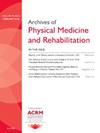与中风后伴侣关系的质量和稳定性有关的因素:系统性文献综述。
IF 3.6
2区 医学
Q1 REHABILITATION
Archives of physical medicine and rehabilitation
Pub Date : 2025-02-01
DOI:10.1016/j.apmr.2024.05.016
引用次数: 0
摘要
目的概述与中风后关系质量和关系稳定性相关因素的知识现状:2022 年 11 月 15 日,检索了 Cumulative Index to Nursing and Allied Health、Embase、MEDLINE、Psychology and Behavioral Sciences Collection、APA PsycINFO 和 PubMed,以查找有关中风后(1)关系质量和(2)关系稳定性相关因素的文献:研究筛选:纳入调查中风后关系质量和/或稳定性相关因素的英文定量和定性研究。三位审稿人独立评估研究资格。如有不同意见,则召开共识会议。共纳入 44 项研究:提取了有关研究目标和特征、参与者人口统计学特征、自变量和因变量以及主要研究结果的信息。研究质量采用 JBI 分析性横断面研究核对表和/或 CASP 定性研究核对表进行评定。这两项工作均由首席审稿人完成,并由第二位审稿人检查。确定的因素根据国际功能、残疾和健康分类模型的领域进行描述和呈现:确定了 37 个与脑卒中后关系质量相关的因素,涵盖身体功能和结构(如认知问题)、活动(如身体亲密程度下降)、参与(如积极参与社交活动)、环境(如药物副作用)和个人因素(如过度警觉)等领域。与人际关系稳定性相关的 8 个因素涵盖了参与(就互惠角色达成一致)和个人因素(如中风前人际关系的质量):结论:中风后的关系质量和稳定性与多种因素有关。未来的研究应确认在少数质量不佳的研究中发现的因素的相关性,探索关系稳定性与身体功能和结构、活动和环境因素领域中的因素之间可能存在的关联,并明确探索中风对关系的潜在积极影响。本文章由计算机程序翻译,如有差异,请以英文原文为准。
Factors Related to the Quality and Stability of Partner Relationships After Stroke: A Systematic Literature Review
Objective
To provide an overview of the current state of knowledge on factors related to relationship quality and relationship stability after stroke.
Data Sources
Cumulative Index to Nursing and Allied Health (CINAHL), Embase, MEDLINE, Psychology and Behavioral Sciences Collection, APA PsycINFO, and PubMed were searched on November 15, 2022, for literature on factors associated with (1) relation quality and (2) relation stability after stroke.
Study Selection
English quantitative and qualitative studies investigating factors associated with relation quality and/or stability after stroke were included. Three reviewers independently assessed eligibility. Consensus meetings were held in case of divergent opinions. A total of 44 studies were included.
Data Extraction
Information regarding study objectives and characteristics, participant demographics, independent and dependent variables, and main findings was extracted. Study quality was rated using the Joanna Briggs Institute Checklist for Analytical Cross-Sectional Studies and/or the Critical Appraisal Skills Programme Checklist for Qualitative Research. Both were administered by the lead reviewer and checked by the second reviewer. Identified factors are described and presented according to the domains of the International Classification of Functioning, Disability, and Health model.
Data Synthesis
Thirty-seven factors related to relationship quality after stroke were identified, covering the domains of body functions and structures (eg, cognitive problems), activities (eg, decrease in physical intimacy), participation (eg, being socially active), environment (eg, medication side effects), and personal factors (eg, hypervigilance). Eight factors related to relationship stability were identified, covering the domains of participation (agreement on reciprocal roles) and personal factors (eg, quality of prestroke relation).
Conclusions
Relationship quality and stability after stroke are related to a multitude of factors. Future research should confirm the relevance of factors found in a few studies of suboptimal quality; explore possible associations between relationship stability and factors falling in the domains of body functions and structure, activity, and environmental factors; and explicitly explore potential positive effects of stroke on relationships.
求助全文
通过发布文献求助,成功后即可免费获取论文全文。
去求助
来源期刊
CiteScore
6.20
自引率
4.70%
发文量
495
审稿时长
38 days
期刊介绍:
The Archives of Physical Medicine and Rehabilitation publishes original, peer-reviewed research and clinical reports on important trends and developments in physical medicine and rehabilitation and related fields. This international journal brings researchers and clinicians authoritative information on the therapeutic utilization of physical, behavioral and pharmaceutical agents in providing comprehensive care for individuals with chronic illness and disabilities.
Archives began publication in 1920, publishes monthly, and is the official journal of the American Congress of Rehabilitation Medicine. Its papers are cited more often than any other rehabilitation journal.

 求助内容:
求助内容: 应助结果提醒方式:
应助结果提醒方式:


